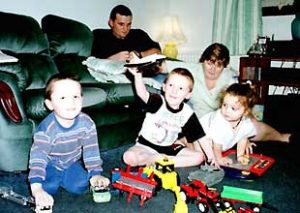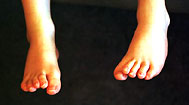Discounted Casualties:The Human Cost of Depleted Uranium, Part 4 <3>Congenital disorders – Harming the unborn
Jun. 4, 2000
Abnormalities in the brain, organs, legs
Clackmannan, population 2000, is 50 kilometers (31 miles) northwest from Edinburgh, the capital of Scotland. By the time I arrived at the municipal housing apartment where Kenneth Duncan (31) lives, it was already dark.
Unable to dress himself
"You were so late we were starting to worry, but we've got the time if you do. Tomorrow is Sunday." Duncan, a truck driver for a small transport company, set me at ease with his strong Scottish brogue. His wife Mandy (32), eldest son Kenneth (5), second son Andrew (4) and daughter Heather (2) were all in the living room to greet me.
"Kenneth has a brain disease called dyspraxia. He's unable even to feed or dress himself." The toes on both his feet were so twisted and painful he had foot surgery two years ago.
The children were soon absorbed in playing with model airplanes, tanks, trucks and other toys, not close to going to bed. Kenneth, despite his surgery, still has obvious problems with his toes.
"Andrew was born 19 months after his brother, and he has problems, too. His intestines and bladder don't function properly. He also has asthma." Duncan looked at his son as he spoke. They only discovered his problems when they started toilet training. "His sphincter is weak, and he lacks normal control of his bladder, so we can't take him out of diapers."
Heather's left ear is a little impaired, and she sometimes has blood in her urine.
The couple believe the congenital problems their children suffer are connected to Duncan's experience in the Gulf War. They came to this conclusion about three years before they became aware of their younger son's problems.
DU detected in urine tests
Duncan, who joined the army at 16, drove a trailer hauling tanks and other weapons close to the front lines during the 1991 Gulf War. During and after the fighting, he transported Iraqi tanks destroyed by depleted uranium (DU) munitions to the port in Saudi Arabia along with his own country's weapons and supplies. He remained in Iraq cleaning up the aftermath until June.
Immediately after returning from the Middle East, he became aware of respiratory problems and pain in his joints. These gradually increased. In 1993, he married Mandy, a soldier stationed on his base, three months after they were discharged. They moved to Clackmannan, Duncan's hometown. He took a job at the transport company, but was plagued by chronic fatigue.
"I knew my health problems were due to the Gulf War. I had my urine analyzed by a Canadian nuclear chemist. He detected DU. Still, I never thought it would affect my kids."
Increasing anxiety about the future
Mandy nodded her agreement. "But thinking about it now, it was strange even right after we were married. Every time we had sex, my pelvic area would burn like it was on fire." Mandy has recently encountered other women with the same experience over the Internet. The story was all too familiar to me, I had heard it from several couples during interviews with American Gulf War veterans.
In 1995, Duncan's employer went bankrupt. Unable to make their house payments, the Duncans were forced to move to municipal housing. The transport company he works for now never sends him around the country like the previous one did. He stays in his own area.
"With my salary and war pension, we make about 1,500 pounds per month. We're getting by for now, but when I think about my own health and my kids', I get really nervous about the future."
Duncan and Mandy are both proud to have "served their country" as soldiers. It gives meaning to their lives. However, the more they learn about the cause of the problems afflicting their children, the more they "can't help feeling angry and disappointed in our country."
"It turns out, we were nothing more than consumable goods." Duncan's words echoed the sentiments I had heard from American veterans.
(Originally published on June 4, 2000)










